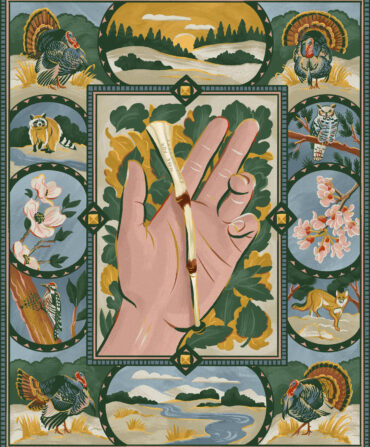Sporting
Inside the Deep Sea Fishing Rodeo
Come summer, the Alabama Deep Sea Fishing Rodeo brings thousands of entrants, decades of tradition, and varying degrees of piscatory prowess to Dauphin Island. Amid the million-dollar yachts and ten-dollar lawn chairs at the world’s largest fishing tournament, a writer and amateur angler wades into the frenzy of a Southern institution
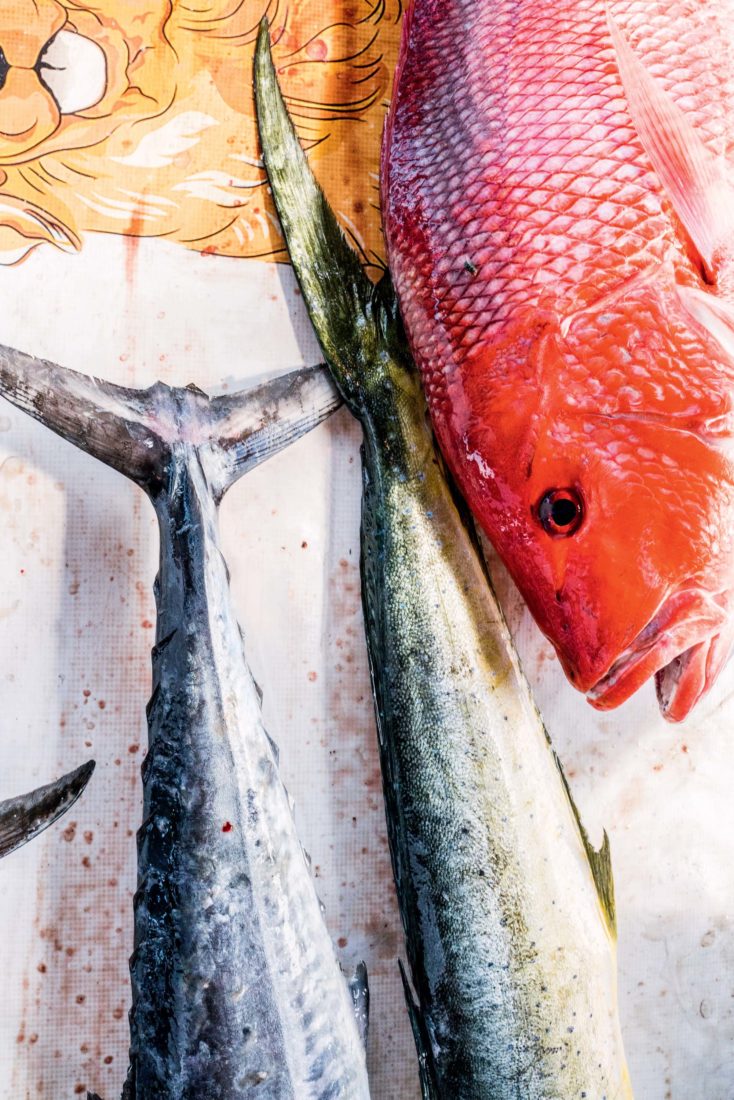
Photo: Randy Harris
The thing about fishing live shrimp for speckled trout is that you have to wait until that orange bobber goes completely under or you’ll set the hook too soon. So says Captain Charlie Gray, who runs Gray Gulf Charters and whom every guide I meet rates as second best on Dauphin Island (you’re always talking to the best). Actually, I’d be happy with any legal fish (trout, drum, sheepshead, whatever), which is all it takes to get your name in the lottery for the twenty-two-foot Contender with a 250-horsepower Yamaha outboard. One year a guy fishing off the pier won it with a little white trout. The Alabama Deep Sea Fishing Rodeo has been held here each July for almost ninety years. Imagine a cross between the Kentucky Derby and the Sturgis Motorcycle Rally, except with nicer people and fish. That’s not exactly it, but it’s close. I’m just getting the hang of this kind of fishing, quickly landing two undersized specks—sleek, silvery bullets just shy of the tournament’s sixteen-inch minimum—when I decide to fall off the boat.
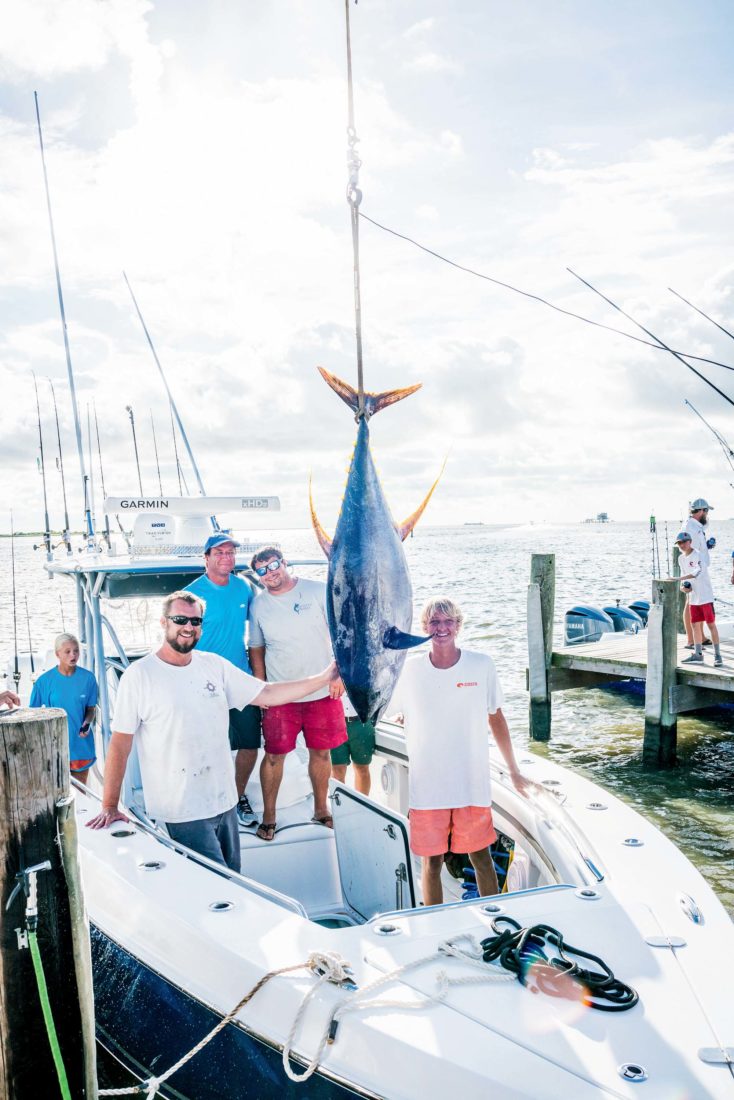
Photo: Randy Harris
A boat at the dock with a nice yellowfin tuna.
It happens when, not having had any hits for a while, I decide to move to the bow. Seated amidships and pouring himself a second margarita—it’s nearly noon and warmish out—is my friend Thomas Shurgar. I place a foot on the gunwale to pass. Either we’re bobbing more than I’d thought or I’m just getting old, because this does not go well. Despite a series of gracefully spasmodic gyrations, it’s clear that I’m going over. Thomas’s eyes widen over the red rim of his go cup in an expression of detached curiosity, as if noting some pelagic bird uncommon in these parts. While I know that this is unfolding faster than it seems to me, my last above-water thought is, nevertheless, that the guy could have tried a little harder to help. And then I’m beneath the green and cooling waters of Mobile Bay watching my own surprisingly large bubbles fizz skyward. I pop back up, unhurt, surprised, and—since I’m desperate to show that I haven’t lost what little sense God gave me—holding aloft Charlie’s rod to prove that I still have it. At which point I realize that my damn phone is in my pocket. The loss of identity a modern person feels at this moment can scarcely be overstated. I feel a sudden empathy for aboriginals who believed a camera could steal their souls, just as the loss of my device has stolen mine. My reflexive instinct—which is no less powerful for being ridiculous—is, by a sheer act of will, to porpoise myself up and out of the water like Flipper. Later, I’ll learn that I actually did rise a few inches. Alas, it’s not enough, and I sink back into the water. Thomas seats his beverage in the console cup holder. Photographer Randy Harris places his stupid little camera on a boat cushion and covers it with a towel. And then they fish me out and ask if I’m okay. Fine, I lie, except for my phone. Being gentlemen, no one says a word about what has just happened. This will last until we walk into a bar.
We keep fishing, but the fish aren’t cooperating. There are boats everywhere around us in all directions. In 2011, the Alabama Deep Sea Fishing Rodeo was recognized by Guinness as the largest fishing tournament in the world. It now attracts more than 3,000 entrants and 50,000 spectators over the three-day competition. Captain Charlie heads for one of his better spots, the wreck of an old banana boat. Somebody is already anchored there. He checks some favored rock piles. Also occupied, with boats dawdling nearby in case the occupiers leave. The rodeo has clogged the waters with guys just like us. We’re out to enjoy ourselves, sure, but none of us would mind winning the boat or the dozens of other prizes, which range from thousands in cash to coolers and air loungers. Charlie has been doing his best, but he’s not a magician. At last he speaks. “They aren’t here, fellas. I wish they were.” He looks more dejected than any of us, the mark of a good guide. We head in.
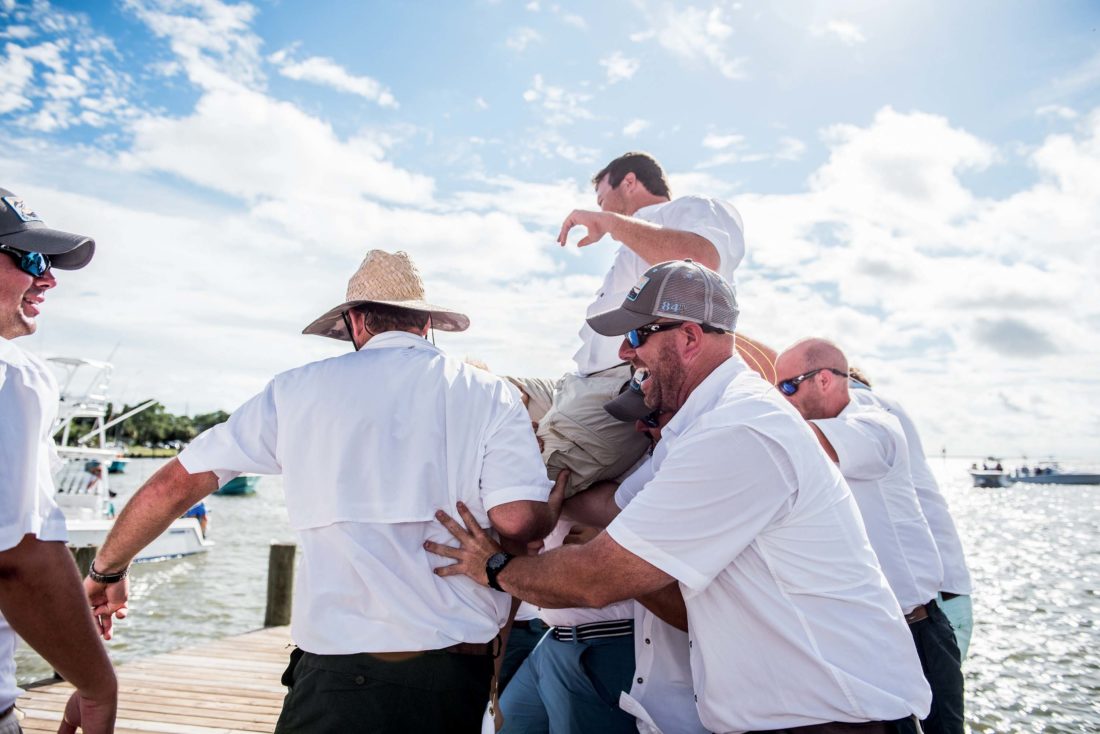
Photo: Randy Harris
The rodeo president goes for a swim.
At the dock, Charlie refuses my money. “C’mon,” I say. “No guide guarantees fish. We’ve taken seven hours of your time, your gas, bait, and tackle. It’s not your fault.” He shrugs. A shrug can convey volumes of information. Charlie’s, I know instantly, is not that of a man waiting to be asked again before reluctantly giving in. It’s final. Still, it falls to me—a responsibility I feel but cannot explain—to see this Kabuki drama through. I try a second time, and then a third. He says that maybe I can buy him a beer later. And then, with a smile and a wave, Captain Charlie Gray drives away.
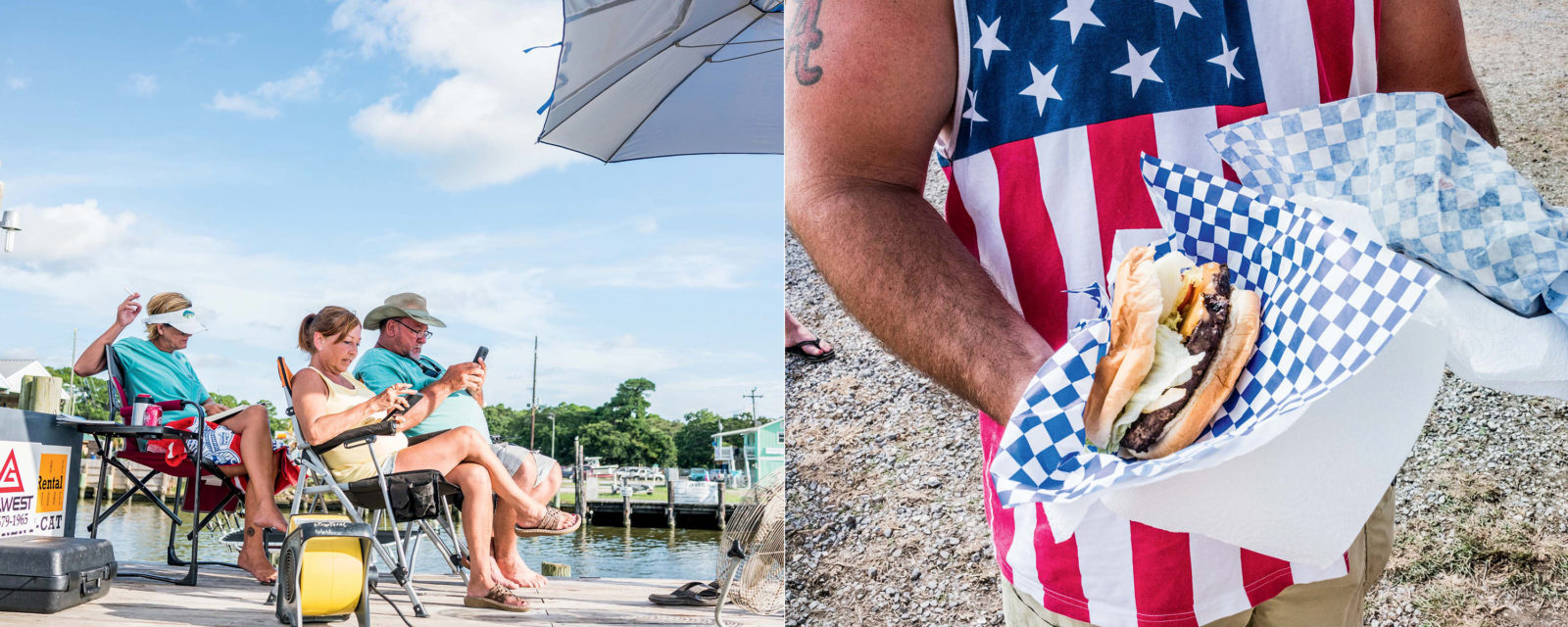
Photo: Randy Harris
From left: Spectators soak up some sun; an all-American meal.
Who gave him the right to be so noble? We seem to be running into a lot of that down here. A guy I chatted up at the boat ramp behind our motel also offered to take me fishing. Even the out-of-towners staying at the motel greet each other cordially in passing. At busy watering holes, people vying for the bartender’s attention will often redirect it toward someone who may or may not have been there first. Then there’s the guy I run into at several bars who wanders around asking strangers if their food and drinks are okay, if they’re having a good time. He doesn’t work for the bars, he’s just a local eccentric. I’m charmed by all this, of course, but also wary. I grew up in D.C., where someone being nice to you without expecting an immediate return means that you’re about to get screwed. What’s the deal here? Is the town’s water supply spiked with antidepressants? Is the entire populace in on some long con tourists only learn about when they get home and can’t find their wallets? I alternately revel in and suspect all the good vibes. Maybe I’ve just lived up North too long.
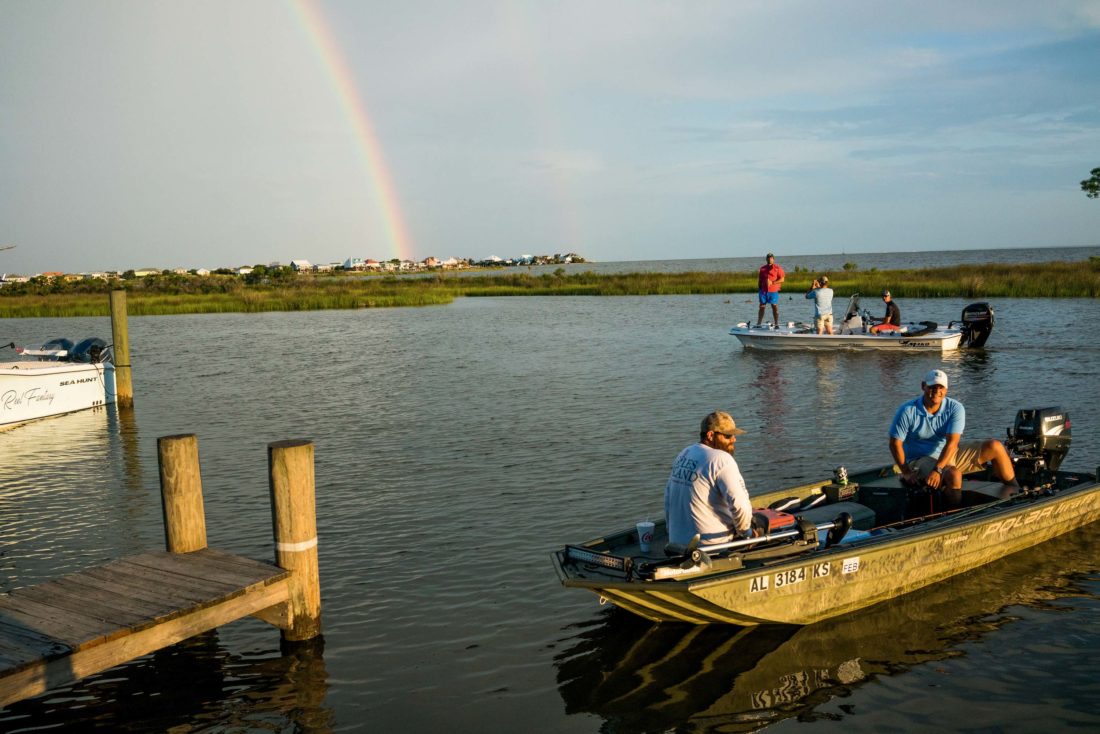
Photo: Randy Harris
Boats headed out.
And yet there’s something in the air at the Deep Sea Rodeo—some beguiling mixture of competition, celebration, and tradition—that is no less palpable for its elusiveness. The rodeo is like Dolly Parton, one of those Southern traditions that don’t so much transcend divisions of class and culture as bypass them altogether. Like Dolly, it’s been around so long that it’s hard to imagine a time when it wasn’t. The rodeo started in 1929, after some Mobile businessmen on a fishing holiday figured that a tournament would be good fun and good business for the area. A gratifying turnout the very next year, when 260 anglers paid five dollars apiece for the entry fee and basic sleeping accommodations, confirmed their intuition. Dauphin Island, a fourteen-mile-long barrier island at the mouth of Mobile Bay, was accessible only by boat in those days. The daily results were relayed to Mobile by carrier pigeon. (The first bridge wasn’t built until 1955. There are Dauphin Islanders today whose parents and grandparents grew up without electricity and only went to the mainland every week or two for groceries.) From early on, the rodeo was a decidedly democratic deal. An early brochure promised, “There’s a fish for everyone, and they will bite as a matter of civic duty.” Well, for most people, anyway.
It all starts at 5:00 a.m. Friday, when a Civil War cannon booms. Well-heeled fishermen on million-dollar yachts roar up to 120 miles out to the continental shelf. They’ll stay out—trolling mostly, a proven way to catch big fish but, if you’re not catching them, a great way to make time stand still—until just before the cannon goes off again at 5:00 p.m. Sunday. Meanwhile, there are guys who’ll spend that same interval fishing along the beaches and jetties from lawn chairs, never farther than arm’s reach from their coolers. And who’s to say which party has the better time? Even the fish divisions are egalitarian, fifteen inshore, fifteen offshore.
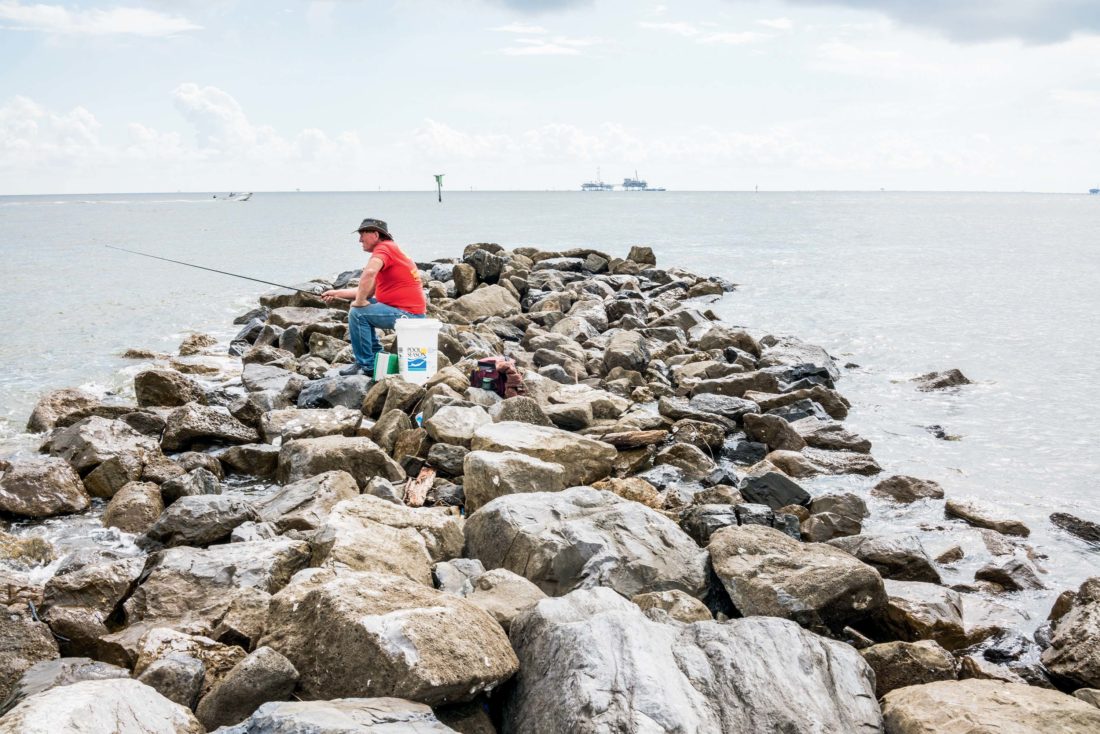
Photo: Randy Harris
A fisherman tries his luck on a jetty.
These days, the offshore guys bring back videos of billfish and sharks rather than killing them. They do take other species—king mackerel, barracuda, yellowfin, and wahoo. Among the inshore species are flounder, jack crevalle, redfish, and pompano. There’s even what’s known locally as a “trash can slam,” a trifecta of the underappreciated ladyfish, bluefish, and gafftopsail catfish, which is basically a saltwater bullhead with a bunch of radar masts installed on its back.
As with the Kentucky Derby, the prizes can’t fully explain the rodeo’s enduring appeal. “Heck,” says Marcus Kennedy, an electrical engineer and Mobile business owner who has been fishing the rodeo all his life, “if they didn’t give anything but a ribbon, a lot of people would still come.” He’s won the Master Angler Award—given to the fisherman scoring the most points across all categories—six times. The first time he was fifteen. “Some folks have been coming for three generations,” he says. “It’s all about bragging rights and tradition. Or maybe it’s the other way around. After a while, it’s sort of hard to tell them apart.”
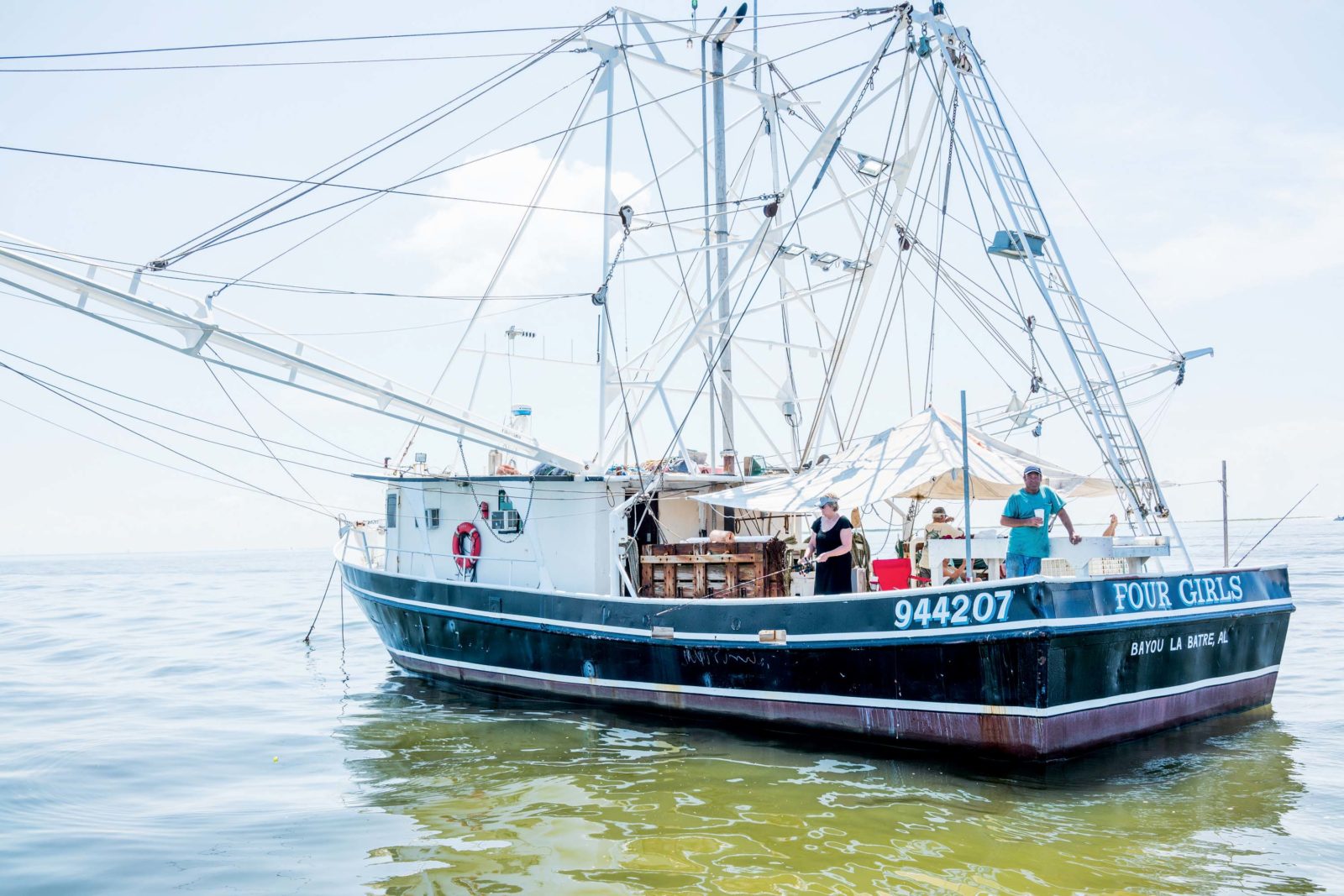
Photo: Randy Harris
An old shrimp boat.
At any three-day party, pacing is everything. After a quick power nap—okay, three hours—at the Gulf Breeze Motel, Thomas, Randy, and I head out on rented beach bikes. I cannot overemphasize the superiority of this mode of transport. It lets you roll past traffic jams and, in all but extreme cases, law-enforcement Breathalyzers, with ease. We coast into the patio and lawn at Dority’s, a popular bar/restaurant thronged with celebrants. On a low stage by the fence, a married duo tosses off covers of early boomer hits, segueing from the Monkees’ “I’m a Believer” to Buffalo Springfield’s “For What It’s Worth” without missing a beat. Thing is, they’re really good. It’s an absurdly pleasant, stress-free scene.
We order Coronas and some shrimp and grits to share. As the beer cans touch wood, my grace period ends. “Dude,” Thomas says, “I’ve never seen anybody lose their dignity so quickly and so completely in my life! That was epic!” His body shakes with silent laughter. There are tears in his eyes. “And who gets on a boat…” (he waves a hand helplessly as he catches his breath) “with their cell phone…in their pocket?” I am delighted to bring such joy to my friend. “Oh my God,” Randy chimes in. “You know how a box turtle pulls its legs in and snaps shut when it’s startled? That’s exactly how you looked!” I pretend to join in the merriment. I have no choice. Thomas has the room key. Randy’s buying. I’d be laughing for real myself if it had been one of them. I just wish it had. I focus on the shrimp and grits. They’re as good as any I’ve ever tasted. I just wish the food were louder.
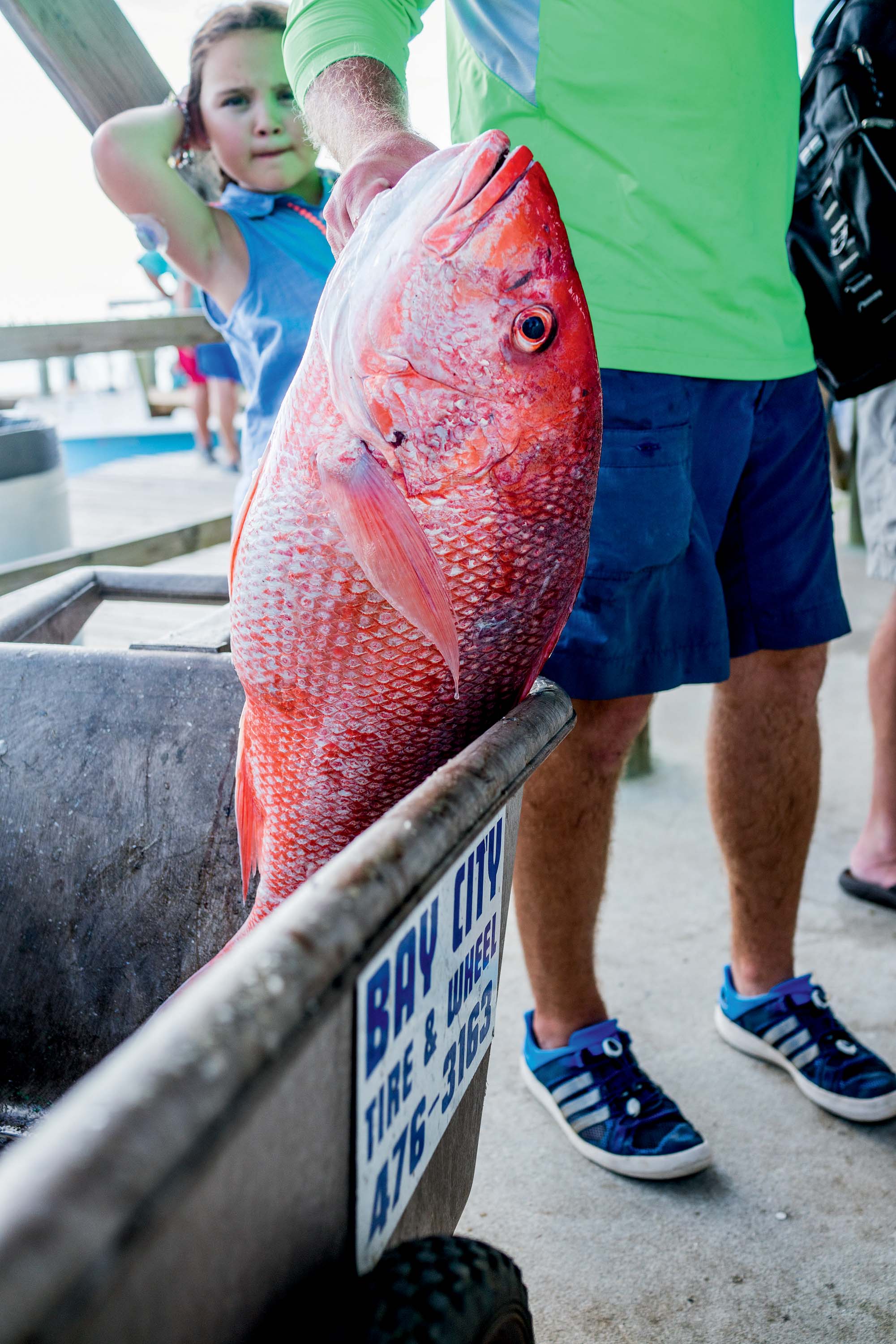
Randy Harris
Suitably refreshed, we pedal four blocks down to the rodeo headquarters, where bands play all day before an open area ringed with food, drink, and merch vendors. Two middle-aged women—black T-shirts, copious tattoos, opaque shades, cigarettes, and go cups—are planted in lawn chairs next to the security barrier at the entrance.
“Y’all look kinda official sitting there,” I say pleasantly. “You with the rodeo?”
“No,” one says tonelessly. “Won’t let you in with your drink.”
“Oh,” I say. “So this is more like the finish-your-drink-first-and-then-go-in zone?”
“More like the finish-your-drink-and-go-home zone,” the other says.
“Rodeo ain’t what it used to be,” the first says cryptically. Later, I’ll learn that the no-outside-alcohol policy is new. Apparently not everybody’s a fan.
She’s not the only person who thinks the rodeo isn’t what it used to be. Preston Mallon, whom I met while hanging around the slip behind our motel, is from an old Dauphin family and grew up here. “Whole place has changed, what with all these six-story condos and beach houses sprouting up like mushrooms,” he tells me. Well, of course, I want to say. Show me something that hasn’t. But I’m not the one watching what he loved cope with ever-accelerating change. I nod.
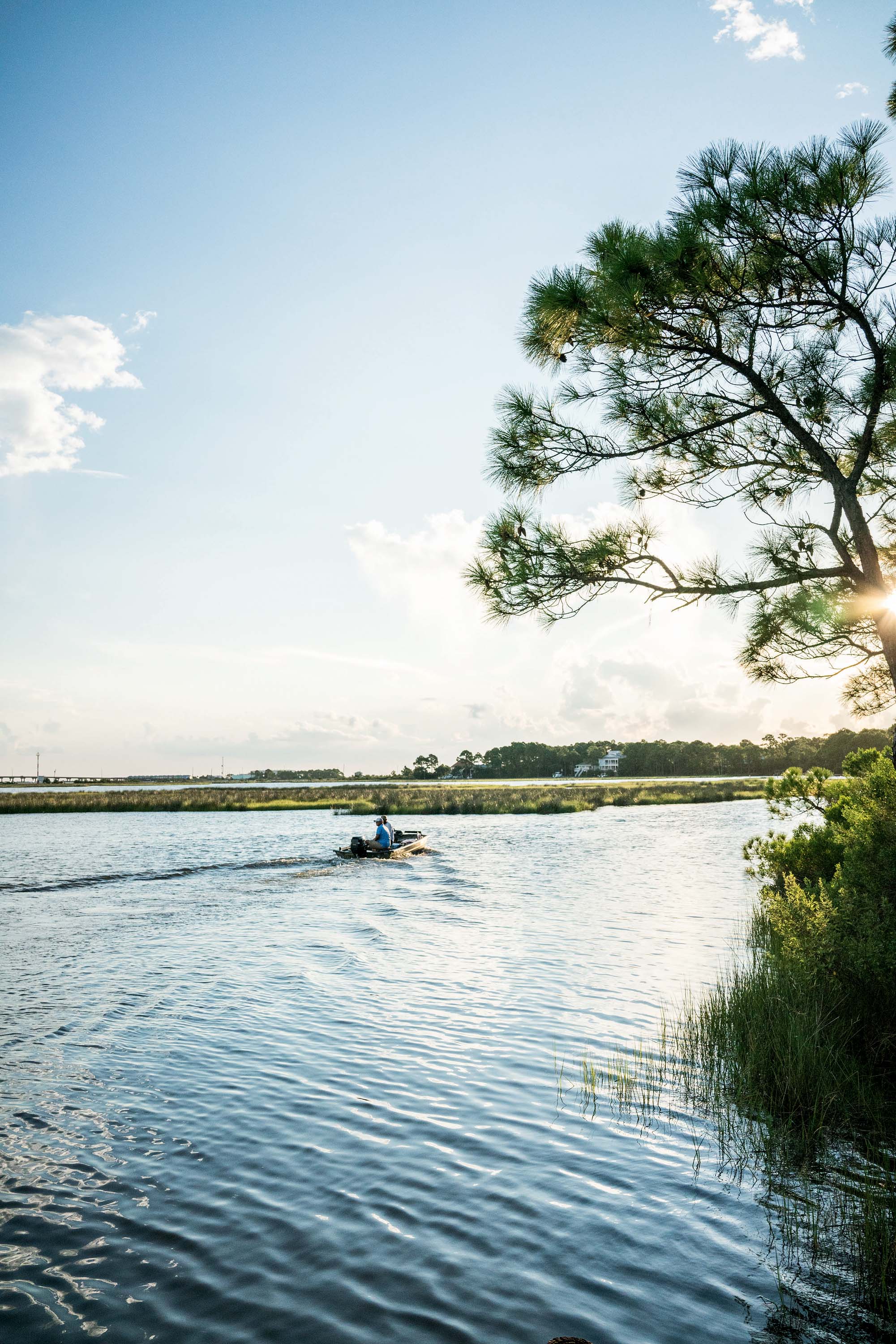
Randy Harris
We make our way through the air-conditioned tent, past vendors selling high-end flip-flops, boat motors, fish-finding radar, and inflatable beach furniture. Onstage, the band is ending its set with a version of “Sympathy for the Devil” in which a mandolin handles the lead guitar part. Left of the stage is Aloe Bay Channel and the docks where boats off-load and register their catch. There’s a buoy sixty yards out that marks the area boats must be inside of by the Sunday deadline. On Sunday just past five, I’ll spot a boat a mile offshore and running full out, pushing a ribbon of fluffy white water before it. They shaved it a little too thin. The deadline brooks no appeal.
The docks and registration tables are swarming with blue-shirted grad students and professors from the University of South Alabama’s Department of Marine Sciences, which has been sending researchers here for decades. Nowhere else can they get a crack at so many species in one place. Some of the anglers wait in line with fish that require wheelbarrows. All inch along patiently to have their catch identified, weighed, and registered. I find Dr. Bob Shipp, who has been here for something like thirty-five years and is the personification of the rodeo. He’s the head judge, a South Alabama professor emeritus and former chair of the marine sciences department, the author of a 256-page guide to Gulf fishes, and a world-renowned biologist. He wears a Greek fisherman’s cap and says that scientists from all over the world, including most American museums, have come here. The Gulf is one of the most diverse, productive fisheries on earth, he continues, and researchers can usually persuade anglers to let them examine fish that would cost the universities thousands of dollars to go out and catch themselves. Some live fish are tagged and fitted with transponders that will track their movements. Almost every year, a few fish are so big that biologists have to revise the maximum size of some species upward. There’s a new state-record Southern stingray on display right now in the ice pit if I want to see. Indeed I do.
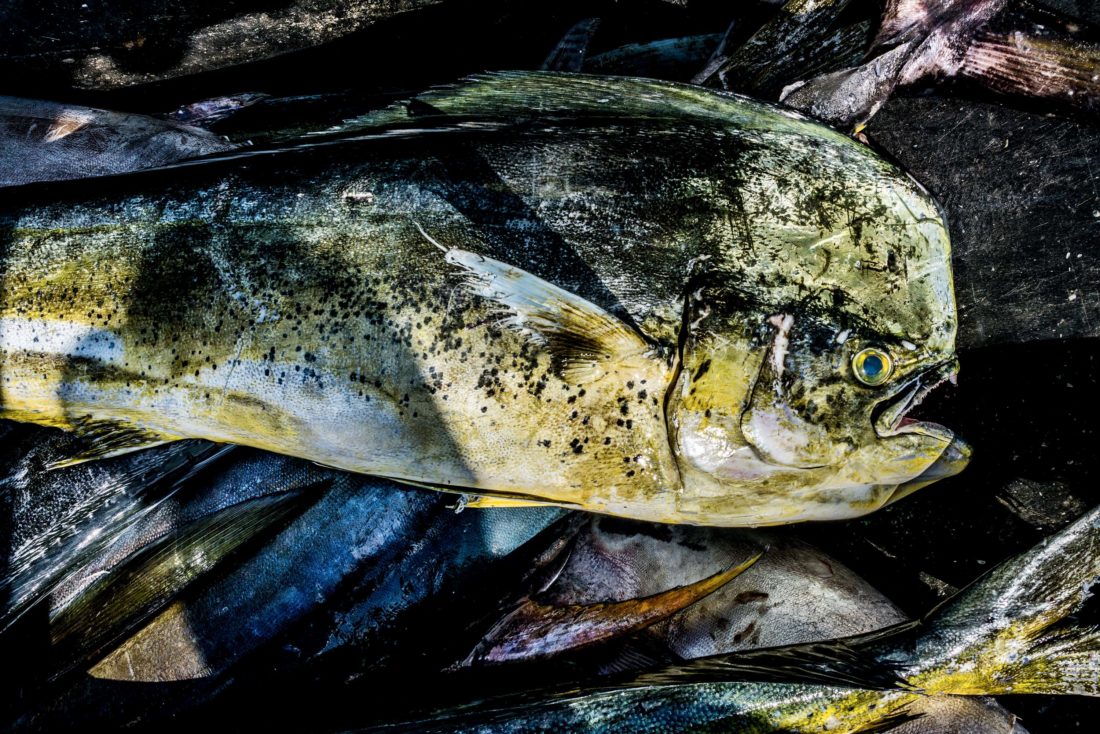
Photo: Randy Harris
A mahimahi.
The ice pit is a cinder-block rectangle about twenty-five feet by ten feet and lined with three-foot-square slabs of ice. Atop them lie about two dozen species of fish on display, including the stingray, which has a body the size of a card table and skin that makes the roughest sandpaper seem like facial tissue. A man I knew with a stingray wallet stopped using it after it wore through the pockets of two pairs of jeans. Grad students deposit new fish and remove others every few minutes. Two young girls—the daughters of professors at South Alabama—walk the ice as sure-footedly as if it were asphalt, hoisting and explaining various fish and their habits to onlookers. They are Claire Powers (“I’m ten, but I’ll be eleven tomorrow,”) and Zoe Drymon, who is nine. Both wear purple rubber lab gloves and Teva sandals and are precociously self-assured. This is not their first rodeo. I ask each to show me her favorite fish. Zoe picks up a toadfish, which she says is especially popular with kids “because it’s super slimy—don’t ask me why.” Claire admires the lionfish, an elegant, showy thing that would not be out of place in a Disney fairy tale but is in fact the most destructive invasive fish in the Gulf. It reproduces frequently, has an insatiable appetite, and threatens both fish populations and reefs themselves. “They’ve got all these venomous barbs and wings that spread out,” she says. “I don’t like that they’re taking over the ocean, but I do like that they have that power.”
Boys are, naturally, drawn to the most menacing fish—barracuda and spotted and green moray eels with their fearsome teeth are especially popular. I watch as one boy holds up a two-foot ’cuda to his younger sister. He squeezes the head so its mouth opens and tries to scare her with it. Instead, the girl, delighted, takes the fish, tucks it under her right arm, and turns away from the pit. She stands there a long moment, pondering her options. Finally, her shoulders sag, and she turns back around and slips the fish back onto the ice. I tap her gently on the shoulder. “You really wanted to take that fish home, didn’t you?” I whisper. “I sure did!” she blurts out. This is, in fact, a big part of what the rodeo is all about. How many places remain where a boy can pick up a recently deceased barracuda and try to scare the bejesus out of his sister without some adult telling him to stop? There’s an unspoken sense that children are to be…not spoiled, but benevolently indulged.
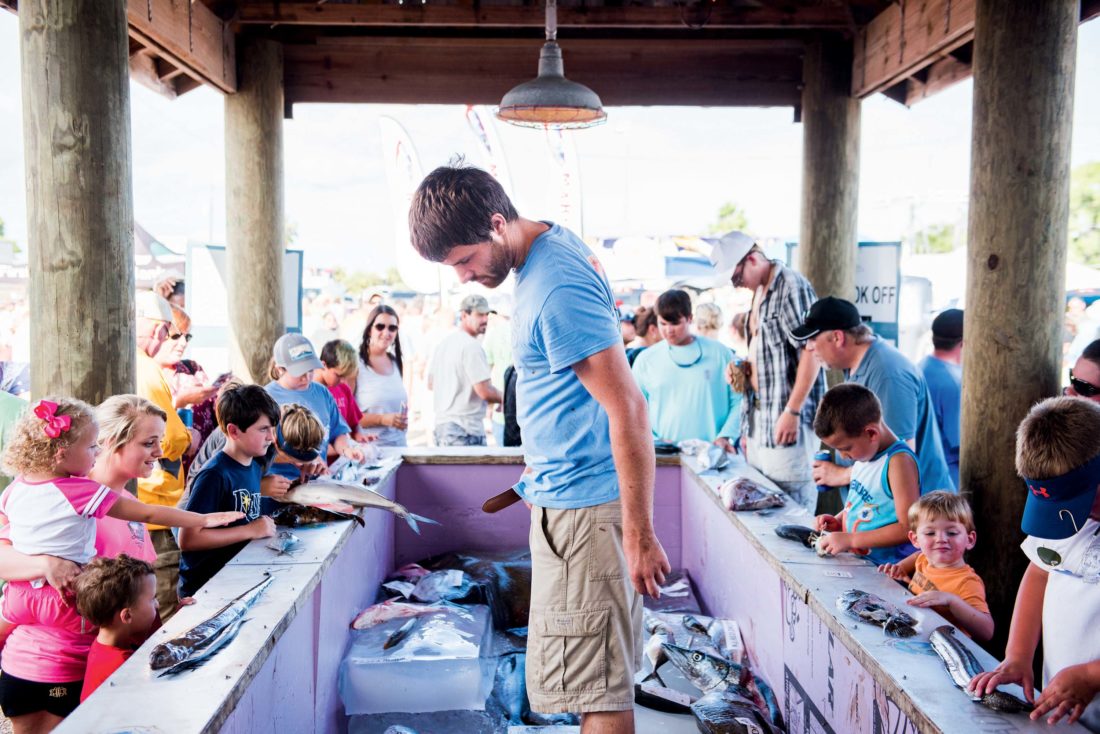
Photo: Randy Harris
Children get a close look at the fish on display.
Claire leads me over to a large galvanized tub of seawater by a trailer that has a built-in live tank. Reid Nelson, a PhD student, is holding a redfish by its tail and sloshing it back and forth in the tub’s oxygenated water. “This is like the recovery room for fish,” he says, not looking up. A couple drove their boat flat out for an hour to bring it in alive, hoping it could be tagged and released. The wife, Tina Wilson, wearing a floppy hat and long sleeves against the sun, can’t stop knotting her hands as she watches. Reid is patient. Someone tells me he spent an hour and a half this morning reviving a speckled trout. That fish ultimately swam away with two sutures and a tag in its belly. I’m not sure what level of dedication is expected of a grad student, but I’m pretty sure this young man is exceeding it.
Moments and people like this are also what the rodeo is about—a student as dedicated as an emergency-room doctor. A couple who cut their fishing short and tore hell-for-leather to get a fish to the researchers alive. Tina Wilson is not a scientist, just another contestant. “When they tag your fish and it swims away, when you know you’re doing something to help the Gulf out,” she says, “it’s just an awesome feeling, you know?”
I go looking for Thomas and Randy and find them watching a 155-pound yellowfin being hoisted out of the hold of one of the offshore boats by a crane. Thomas has been kind enough to get me a bushwacker, the rodeo’s unofficial cocktail. It’s an ice cream drink with an artful swirl of chocolate syrup running through it that goes down easy but will, I’ve heard, knock you into next week if you’re not careful. He’s halfway through telling me where to get some great fried fish when the closing cannon rends the air fifty feet away. It comes without warning, and I duck involuntarily, dropping my drink onto the ground. I look up to see Thomas sipping his. “It’s okay, buddy,” he says kindly. “Stand’s still open. I’ll get you another.”
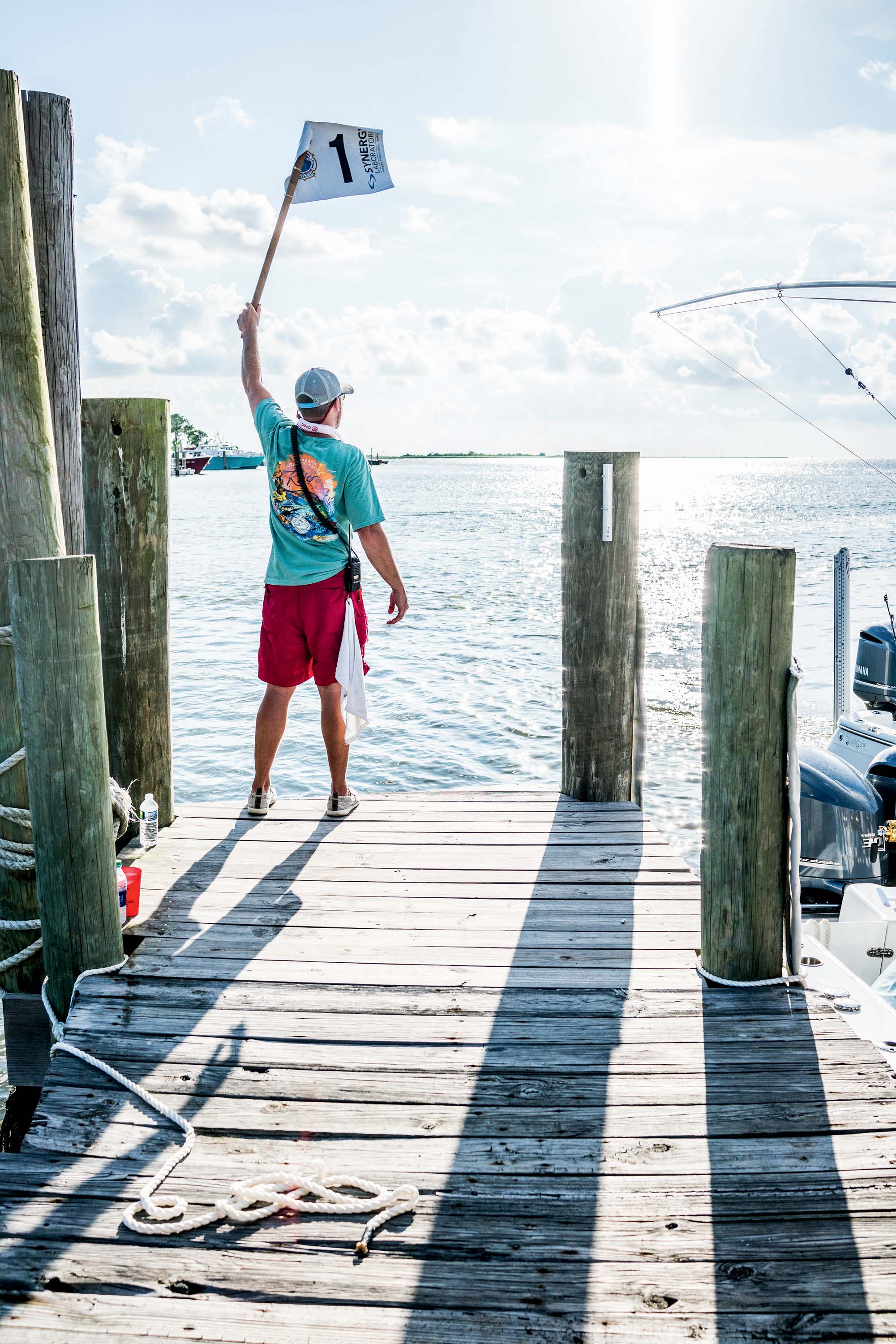
Randy Harris
The Mobile Jaycees, who’ve organized the event and worked round the clock to bring it off, throw this year’s president off the pier, another rodeo tradition. People start drifting toward their cars and rental condos, and I can’t help but feel like I got to be part of something more than just fun and relaxing. I got to sink my teeth into something rare and enduring. I’m betting that in twenty years, people will look back and lament that the rodeo is no longer what it was back in the teens.
On the way out, I pass the little girl who didn’t steal the barracuda. Her brow is furrowed, as if she wishes she had. I find myself wishing the same thing.



